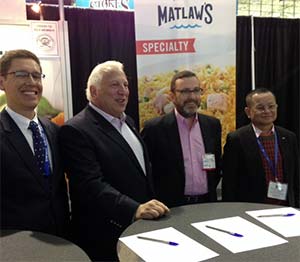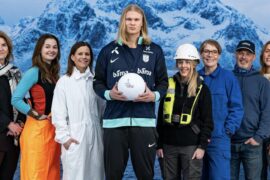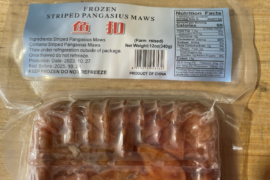Jeff Sedacca, on behalf of National Fish & Seafood (NFS), a US division of the Hong Kong-headquartered Pacific Andes Group, on March 7 signed of a Memorandum of Understanding (MoU) with representatives of the Global Aquaculture Alliance (GAA) and Vietnam-based Minh Phu Seafood Corporation, one of the largest aquaculture producers in the world. The event took place at the Gloucester, Massachusetts-based NFS’ booth during Seafood Expo North America in Boston.
The MoU will help bring over 800 small aquaculture farms into the ranks of certified facilities over the next 12 months, enabling them to meet growing market demand for certified shrimp. Additionally, farmers are deploying an innovative approach to aquaculture within the sensitive and vulnerable mangrove forest through a practice that enables the environment to thrive while enriching the aquaculture ecosystem.
 Signatories to the MoU are (seen second from left to right): Jeff Sedacca, president of National Fish & Seafood’s shrimp division; Peter Redmond, vice president of global market development for the Global Aquaculture Alliance; and Le Van Quang, chief executive officer and chairman of Minh Phu Seafood Corporation. Observing at the far left is James Baros, aquaculture and sustainability manager at National Fish & Seafood.“We are proud of this initiative, as it will shape the future of our industry and chart a course that will deliver exceptional product, ethical accountability and environmental sustainability while meeting ever-growing customer demand,” said James Baros, National Fish & Seafood’s aquaculture and sustainability manager.
Signatories to the MoU are (seen second from left to right): Jeff Sedacca, president of National Fish & Seafood’s shrimp division; Peter Redmond, vice president of global market development for the Global Aquaculture Alliance; and Le Van Quang, chief executive officer and chairman of Minh Phu Seafood Corporation. Observing at the far left is James Baros, aquaculture and sustainability manager at National Fish & Seafood.“We are proud of this initiative, as it will shape the future of our industry and chart a course that will deliver exceptional product, ethical accountability and environmental sustainability while meeting ever-growing customer demand,” said James Baros, National Fish & Seafood’s aquaculture and sustainability manager.
The BAP certification program is a globally recognized standard and aquaculture management system that covers a comprehensive approach to areas such as social responsibility, animal health and welfare, environmental, food safety and traceability throughout the aquaculture supply chain.
This MoU supports an innovative approach for unifying small aqua farmers that would typically lack infrastructure, training and resources to access the BAP certification processes independently. It empowers them to become certified as a group – elevating each farmer’s ability to sell product successfully in an increasingly competitive and selective marketplace that demands BAP certification to ensure high standards of production and quality.
Additionally, the program supported by the MoU includes an environmental benefit due to the integrated mangrove forest shrimp farming being practiced by a number of the farms participating. As a result, mangrove forests are maintained and preserved to provide habitat and food for the animals that are raised in small channels and ponds within the forest.
In these systems, shrimp are raised with no feed or chemicals. The ecosystem fully relies on its own natural productivity, which creates incentives for those engaged in aquaculture to maintain mangroves. The forest provides the shrimp with natural food, as well as higher, more stable incomes for farmers.
The signatories are applying for co-funding from IDH, a Dutch, Swiss and Danish sustainable trade organization, via the GAA, to further support the exciting project.
About NFS
National Fish & Seafood supplies frozen seafood products to major retailers, distributors, institutional foodservice and restaurant chains located across the United States. Every year the company sources, processes and distributes more than 11,500 tons of frozen raw fish fillets and shrimp, cooked shrimp, breaded fish and other seafood items under its National Fish, Matlaw’s and Schooner brands. Matlaw’s stuffed clams are the top-selling seafood appetizers in the United States.
About Best Aquaculture Practices
A division of the Global Aquaculture Alliance, Best Aquaculture Practices is an international certification program based on achievable, science-based and continuously improved global performance standards for the entire aquaculture supply chain – farms, hatcheries, processing plants and feed mills – that assure healthful foods produced through environmentally and socially responsible means.





